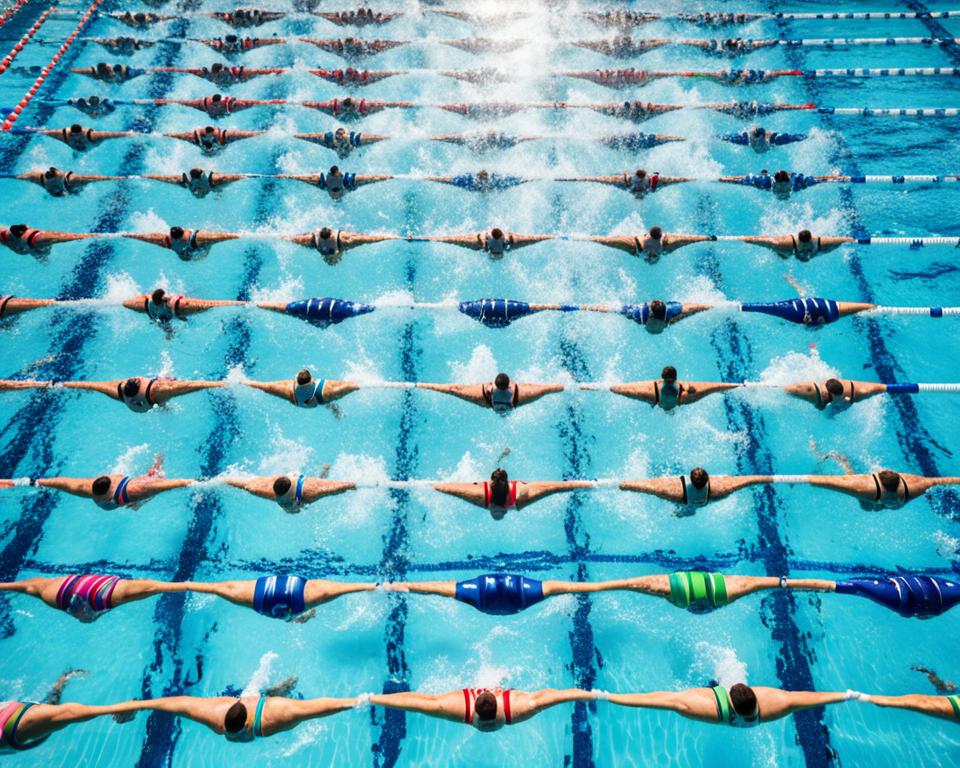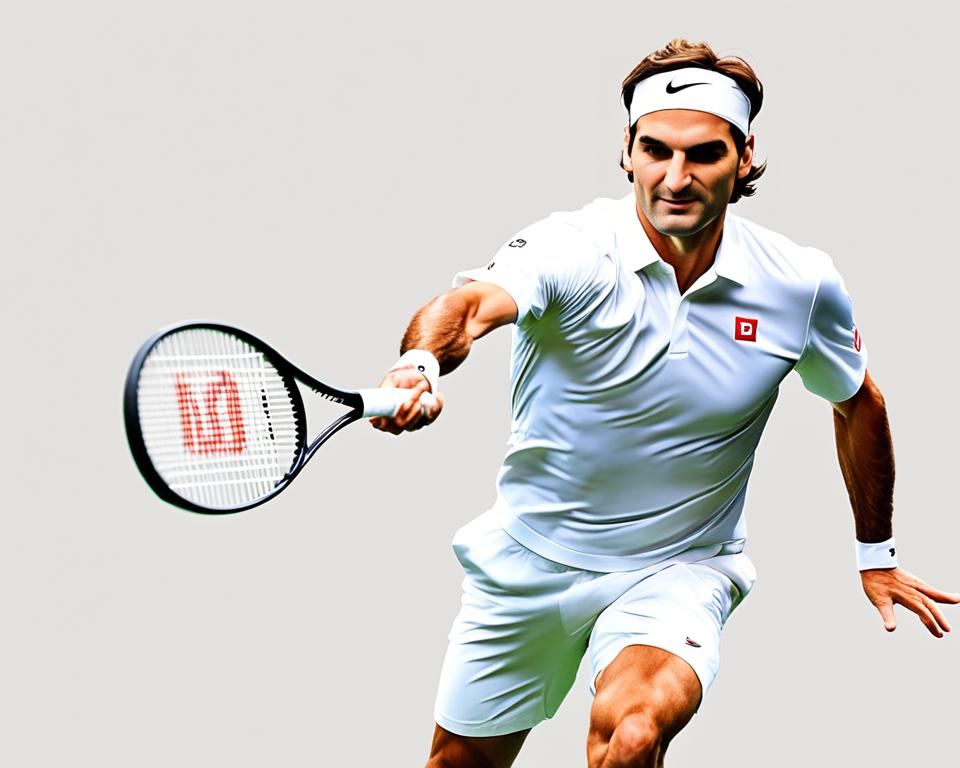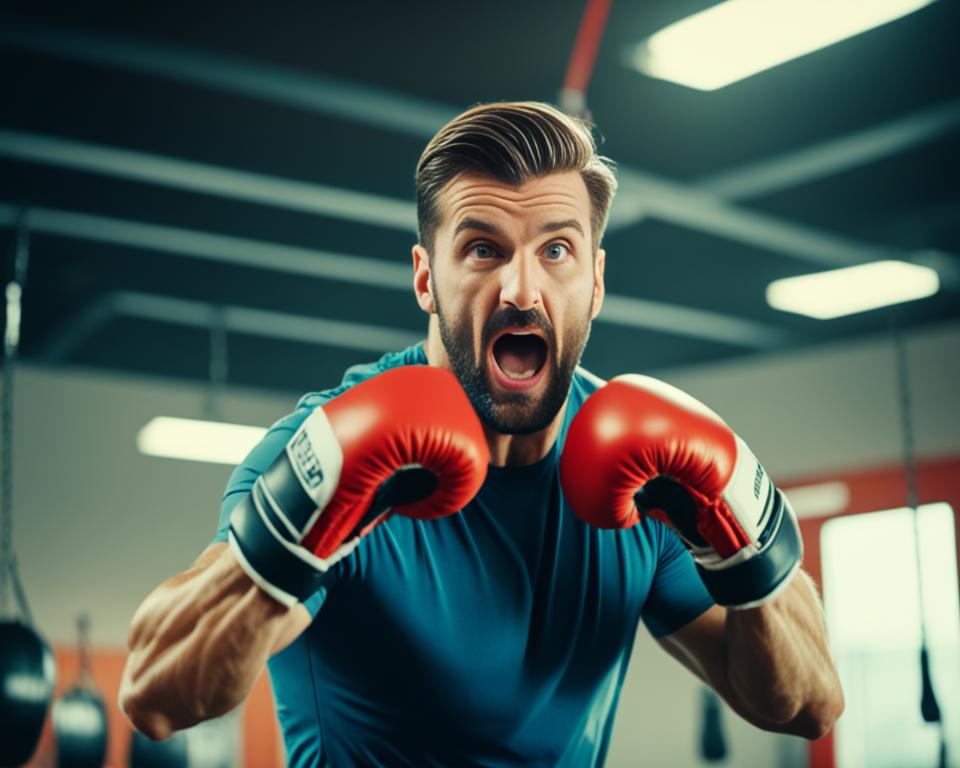The title of “best Olympic swimmer” is highly sought after and often discussed. Many amazing athletes have shown their skills in the pool at the Olympic Games. One of the top names in these talks is Michael Phelps, who has won the most Olympic medals ever. His achievements have made him a legendary figure in swimming. But, there are others with notable accomplishments who have also made a big impact on the sport.
Let’s dive into the fascinating world of Olympic swimming. We’ll look at the sport’s rich history, its top records, and the new talents ready to shine on the world stage. Come with us as we uncover the journey to becoming the “best Olympic swimmer” and the athletes who are well remembered for their swimming brilliance.
Introduction to Olympic Swimming
The sport of olympic swimming started in the first modern Olympic Games in 1896. Since then, it has grown with new events and better techniques. The world now cheers on amazing swimming competitors who break records with each stroke.
The Prestigious History of Olympic Swimming
In Athens, Greece, the early Olympics had short swimming races. Today, the olympic swimming program is much bigger, including various strokes and team relays.
From the start, swimming legends have amazed us with their speed and strength. The history of olympic swimming is full of unforgettable moments brought by these champions.
Overview of Swimming Events and Categories
The olympic swimming events are designed to showcase the best in the sport. They include:
- Freestyle (100m, 200m, 400m, 800m, 1500m)
- Backstroke (100m, 200m)
- Breaststroke (100m, 200m)
- Butterfly (100m, 200m)
- Individual Medley (200m, 400m)
- Relay events (4x100m Freestyle, 4x200m Freestyle, 4x100m Medley)
These various events challenge swimmers’ versatility and skills. Competitors aim to win Olympic medals and make their mark on sports history.
Michael Phelps: The Undisputed King
When we talk about Olympic swimming, one name truly stands out. This is Michael Phelps. The American swimmer has proven he is the most successful Olympic athlete ever. He has won a total of 28 Olympic medals. Of those, 23 are gold.
Phelps’ Remarkable Career Highlights
In 2000, Michael Phelps made his first big splash at the Sydney Games, aged 15. From that point on, he has been breaking records and winning big. Across five Olympics, from 2000 to 2016, Phelps dominated both the individual and relay events.
- Phelps is the only swimmer to win the same individual event (the 200m butterfly) at three consecutive Olympics (2004, 2008, 2012).
- In the 2008 Beijing Olympics, he amazed everyone by winning eight gold medals. This set a record for the most golds won in a single Olympics by any athlete.
- Phelps is the top Olympian, with a whopping 28 Olympic medals. These include 23 gold, 3 silver, and 2 bronze.
His Legacy and Impact on the Sport
Phelps’ influence goes beyond his medals. He has motivated countless swimmers to strive for better. His strict work ethic, skill, and poise under stress make him a swimming legend.
“I can’t be the next Michael Phelps, because there is only one Michael Phelps. I can only be the first Ryan Lochte.”
Phelps’ effect on swimming is obvious. He changed the game by setting many swimming records. He redefined what it takes to be at the top. His drive and mental toughness have made him a guide for swimmers everywhere.
Who is the Best Olympic Swimmer?
Finding the top Olympic swimmer is hard. There have been many greats over the years. Even though Michael Phelps’ many wins show his skill, others have also done amazing things at the Olympics.
We look at things like how many medals someone has, world records they’ve set, and their overall influence on swimming. This makes choosing the best swimmer tough. And, as new talented swimmers come, the debate might never end.
Let’s dive into the top athletes and see who might be the best Olympic swimmer:
- Michael Phelps – He’s won the most Olympic medals ever, with 28, 23 of them gold. He has set many world records and is known as one of the best sports athletes ever.
- Katie Ledecky – A star in American swimming, she’s won several gold medals in the Olympics and world championships. Her records in distance freestyle are unmatched.
- Mark Spitz – In 1972, this American swimmer won 7 gold medals and set world records in every event. His wins were a big moment in swimming history and inspired many athletes.
The argument over the top Olympic swimmer is likely to carry on. As new stars emerge, the sport grows, making it an exciting topic.
Analyzing Swimming World Records
World records in swimming are the highest achievements in the sport. They show the amazing skills and dedication of top swimmers from around the world. Looking at how these records have changed over time tells us a lot about improving techniques, the role of new technology, and the constant push for better performance.
Breaking Down the Fastest Times
Swimming world records cover everything from the quick 50-meter sprints to the demanding 1500-meter races. Let’s explore some of the most remarkable records:
- 50-meter Freestyle: The current world record holder is Caeleb Dressel of the United States, who completed it in 20.16 seconds.
- 100-meter Freestyle: Kristóf Milák of Hungary set the world record with a time of 45.59 seconds, stunning all who watched.
- 200-meter Freestyle: The record in this event belongs to Kyle Chalmers from Australia, finishing in 1:40.85.
- 400-meter Freestyle: Li Zhuhao of China achieved a record time of 3:30.61, showing strength and a smooth swimming style.
- 1500-meter Freestyle: Gregorio Paltrinieri from Italy holds the current record with an incredible 14:32.80.
| Event | World Record Holder | Time |
|---|---|---|
| 50m Freestyle | Caeleb Dressel (USA) | 20.16 seconds |
| 100m Freestyle | Kristóf Milák (Hungary) | 45.59 seconds |
| 200m Freestyle | Kyle Chalmers (Australia) | 1:40.85 |
| 400m Freestyle | Li Zhuhao (China) | 3:30.61 |
| 1500m Freestyle | Gregorio Paltrinieri (Italy) | 14:32.80 |
These records not only show the incredible talent and hard work of the athletes but also how swimming is always evolving. With new technology and research in sports science, even more amazing records are likely to be set in the future.
Female Olympic Swimming Legends
The world of Olympic swimming was mainly a men’s domain initially. However, women swimmers have carved out their space with amazing achievements. Champions like Dawn Fraser, Shane Gould, Katie Ledecky, and Simone Manuel have shown incredible skill and strength in the pool.
Female swimming icons have set world records, earned numerous gold medals, and motivated young athletes. Their journeys, from facing challenges to breaking through barriers, are inspiring to see. They show the world the power and resilience of female athletes in the Olympics.
Trailblazers and Pioneers
Dawn Fraser is a standout in Australian swimming history. She is seen as one of the top female world champions, with eight Olympic medals to her name. Fraser’s four golds and world records in the 100m and 200m freestyle stood for more than ten years.
Shane Gould also made history, holding world records in every freestyle from 100m to 1500m at once. With three golds in Munich, she set a high standard for female swimmers. Her achievements opened new doors for upcoming female swimmers.
Modern-Day Superstars
- Katie Ledecky, from the US, has been a force in the olympic swimming scene lately. She boasts seven Olympic golds and multiple world records. Ledecky is truly a standout in her time.
- Simone Manuel made a powerful impact by becoming the first African American woman to win individual gold in 2016. She stands as a symbol of diversity and has inspired many young athletes. Her success shows that dreams know no bounds.
These legends have not only excelled in swimming but opened doors for others to follow. They are symbols of dedication, excellence, and perseverance. Their journeys show how far passion and hard work can take you, driving athletes and fans worldwide.
Rising Stars in Olympic Swimming
The world of Olympic swimming is changing, and a new group of skilled athletes is ready to shine. These rising stars come from different places and backgrounds. They are showing great promise and starting to stand out globally.
Regan Smith, Maggie Mac Neil, and David Popovici have wowed fans. They’ve set new records and won big swimming competitions. These young talents are the future of the sport, giving a preview of what’s to come in Olympic swimming.
These athletes will soon be well-known everywhere. Their hard work and natural talent inspire others. They show the true spirit of the sport, motivating the next group of Olympic swimmers to aim for the top.
Ones to Watch
- Regan Smith (United States): A teenage sensation in Olympic swimming, she’s broken records and earned gold medals.
- Maggie Mac Neil (Canada): Known for her speed, Mac Neil is now a major player on the world stage.
- David Popovici (Romania): At 18, Popovici has already made a big impact with his speedy swims and bright future.
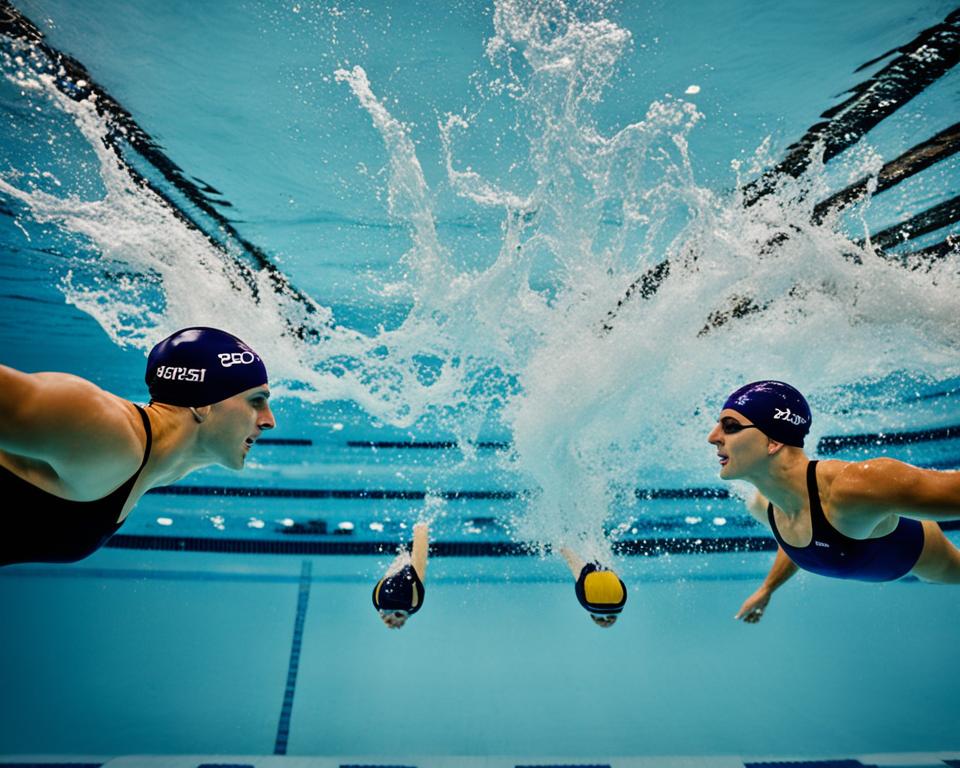
“These rising stars represent the future of the sport, offering a glimpse into the continued evolution and progression of Olympic swimming.”
With dedication and pushing their limits, these young talents are on the rise. Olympic swimming will surely be amazed by their efforts. The future of the sport is incredibly promising, with these rising stars leading the way.
The Mental and Physical Demands of Olympic Swimming
Olympic swimming demands top-notch physical and mental skills. Swimmers need great heart health, strong muscles, and quick bursts of energy. They also need to keep their form just right over long races. And, the mental side of things is just as important for winning.
These top olympic swimmers need to stay focused and strong. They train hard to push their bodies and minds. This effort tests how well they can handle stress and challenges.
Swimmers must be both physically and mentally tough to win in the Olympic pool. Their training is focused on several key areas:
- Exceptional cardiovascular fitness to keep a high pace for long stretches
- Powerful muscles to make quick and strong movements at starts and turns
- Flawless technique for smooth and fast swimming
- Unparalleled mental fortitude to block out everything except their goal
The mental challenge in olympic swimming is huge. Swimmers need to ignore distractions and stay completely focused. They also have to be tough, because losses and obstacles are part of the game.
Knowing what it takes to succeed in olympic swimming shows how amazing elite swimmers really are. And, it acknowledges the hard work they put in.
“Swimming is the only sport where the world record is a time, not a distance. It’s not about how far you go, it’s about how fast you get there.”
Popular Swimming Events at the Olympics
The Olympic swimming lineup includes many exciting events. These races are watched by people all over the globe. They range from fast 50-meter freestyle to the demanding 1500-meter freestyle. Each one lets the world see different swimming skills and talents.
The 100-meter butterfly, 200-meter individual medley, and team relay events are always a hit. In a relay, four swimmers from a team take turns swimming. They show off their speed, plans, and how well they work together. These competitions offer lots of excitement and unforgettable moments.
Exciting Races and Competitions
- 50-meter freestyle: A fast, short sprint that’s all about quick speed and sharp reactions.
- 1500-meter freestyle: A long, hard test of strength and will, pushing the limits of endurance.
- 100-meter butterfly: A mix of power and skill, highlighting a swimmer’s command over the butterfly stroke.
- 200-meter individual medley: A race where flexibility is key, as competitors must be strong in four different strokes.
- Relay events: Teams compete to show off their combined speed, precision, and agreement in strategy.
The Olympic swimming events are thrilling showcases of the top water athletes in the world. They draw in huge crowds and highlight excellence in aquatic sports. The spirit and tension at these events are unforgettable.
“The Olympic swimming events are where dreams are made and records are shattered. Each race is a thrilling display of athleticism, strategy, and pure passion.”
| Olympic Swimming Event | Distance (meters) | Stroke |
|---|---|---|
| Freestyle | 50, 100, 200, 400, 800, 1500 | Freestyle |
| Backstroke | 100, 200 | Backstroke |
| Breaststroke | 100, 200 | Breaststroke |
| Butterfly | 100, 200 | Butterfly |
| Individual Medley | 200, 400 | All four strokes |
| Relay | 4×100, 4×200 Freestyle; 4×100 Medley | Freestyle, Medley |
Training Regimens of Olympic Swimmers
Becoming an Olympic-caliber swimmer takes a lot of work. Swimmers at this level stick to a tough, well-planned training schedule. They spend many hours getting better at their sport, getting stronger, and working on their technique.
Olympic swimmers work hard in the pool, at the gym, and doing other activities. This mix helps them become top athletes in swimming. It’s all about shaping every physical quality needed to win.
These top athletes focus not just on training but also on resting, eating right, and being mentally ready. This all-around preparation is crucial for performing their best when it counts.
The effort Olympic swimmers put into training is unmatched. They are always striving to be better. This drive helps them break records and win medals.
The Power of Consistency
Olympic swimmers work out intensely every day. They spend up to 8 hours on training, which includes the following:
- Pool sessions to improve technique and stamina
- Strength exercises to get stronger and look toned
- Other sports like running and yoga to boost overall health
Working this hard is what makes elite swimmers exceptional. It leads to the incredible performances we see at the Olympic games.
Recovering and Refueling
Recovery and eating well are just as big a part of training for these swimmers. They watch their sleep, diet, and water intake closely. This helps their bodies handle the tough demands of swimming.
“The toll of preparing for the Olympics, both mentally and physically, is huge. That’s why we must be very careful about how we recover and eat. Good nutrition keeps us going strong to perform at the highest level.” – [Swimmer’s Name], [Olympic Gold Medalist]
By managing training, rest, and eating right, Olympic swimmers perform at their best. This approach lets them keep getting better and win in their sport.
Memorable Olympic Swimming Moments
The history of Olympic swimming is filled with moments that have amazed people around the globe. These races have made stars of elite swimmers, drawing fans to the sport with their incredible performances.
Michael Phelps’ Extraordinary Dominance
Michael Phelps stands out for his exceptional wins in the Olympics. At the 2008 games in Beijing, he won an unprecedented eight gold medals. This feat solidified his place as a top Olympian, inspiring others to strive for greatness.
Katie Ledecky’s Dominant Displays
Another star of recent Olympics is Katie Ledecky, known for crushing records in freestyle swimming. She has won several golds with amazing displays of power and precision. Ledecky’s success has earned her a spot as one of the best in olympic swimming.
Dramatic Relay Finishes
Relay races in olympic swimming also offer thrilling moments. The fight for gold among teams often leads to dramatic finishes. Watching these events has become a key part of enjoying the Olympic Games.
Emotional Triumphs and Newcomers
More than breaking records, the olympic swimming events highlight new champions’ joy and emotion. These stories of victory and excellence add to the sport’s rich appeal.
The drama and emotion of olympic swimming make it a favorite at the games. Its mix of skill, tension, and human spirit ensures it’s remembered as iconic moments in Olympics history.
The Impact of Technology on Olympic Swimming
The world of olympic swimming has changed a lot lately, all thanks to technology. High-tech swimsuits and special fabrics have made a big difference. They’ve also introduced new timing and monitoring systems. With these, swimmers can go faster, break world records, and improve their swimming performance.
Technology is not just about making things faster. It’s also improved how swimming techniques work, how athletes train, and how competitions are studied. This mix of technology and human effort will likely change Olympic swimming even more. It may lead to new achievements for swimmers in the future.
Technological Advancements in Swimming
- High-tech swimsuits and performance-enhancing fabrics
- State-of-the-art timing and monitoring systems
- Improved video analysis and biomechanical feedback
- Innovative training equipment and recovery tools
- Data-driven performance optimization
The Impact on Swimming Performance
- Faster times and world record-breaking swims
- Enhanced stroke efficiency and streamlining
- Personalized training and recovery programs
- Real-time monitoring of physiological data
- Increased precision in competition analysis
| Technology Advancement | Impact on Swimming Performance |
|---|---|
| High-tech swimsuits | Improved buoyancy and reduced drag, leading to faster times |
| Motion tracking systems | Enhanced biomechanical analysis and technique refinement |
| Wearable sensors | Real-time monitoring of physiological data for performance optimization |
| Video analysis software | Detailed feedback on stroke mechanics and race strategy |
The future of Olympic swimming will keep changing with technology. This mix of technology and athlete effort will open up new success opportunities. It’ll keep pushing the sport to higher achievements.
Nutrition and Dietary Habits of Elite Swimmers
Being an Olympic swimmer means taking care of what you eat and your nutrition. For elite swimmers, balancing calories, nutrients, and staying hydrated is key. It helps them keep up with the tough training regimens and competitions.
Each swimmer has a special nutrition plan that helps them recover from swimming, build muscle, and stay energetic. They work with experts like sports nutritionists and dietitians. This is to make sure their meals and snacks are just right for their bodies.
Fueling for Peak Performance
These athletes have smart eating plans, from loading up on carbs before a race to focusing on proteins after. This is how they stay fit and strong in the water.
- Eating meals and snacks with lots of carbs is vital for their energy.
- Getting enough protein helps their muscles heal fast and stay strong.
- Drinking lots of water and electrolyte-rich drinks keeps them from getting tired too quickly.
| Macronutrient | Recommended Daily Intake for Elite Swimmers |
|---|---|
| Carbohydrates | 6-10 grams per kilogram of body weight |
| Protein | 1.2-2.0 grams per kilogram of body weight |
| Fat | 0.5-1.5 grams per kilogram of body weight |
A special nutrition and dietary plan helps Olympic swimmers perform at their best. This is how they reach their top swimming form.
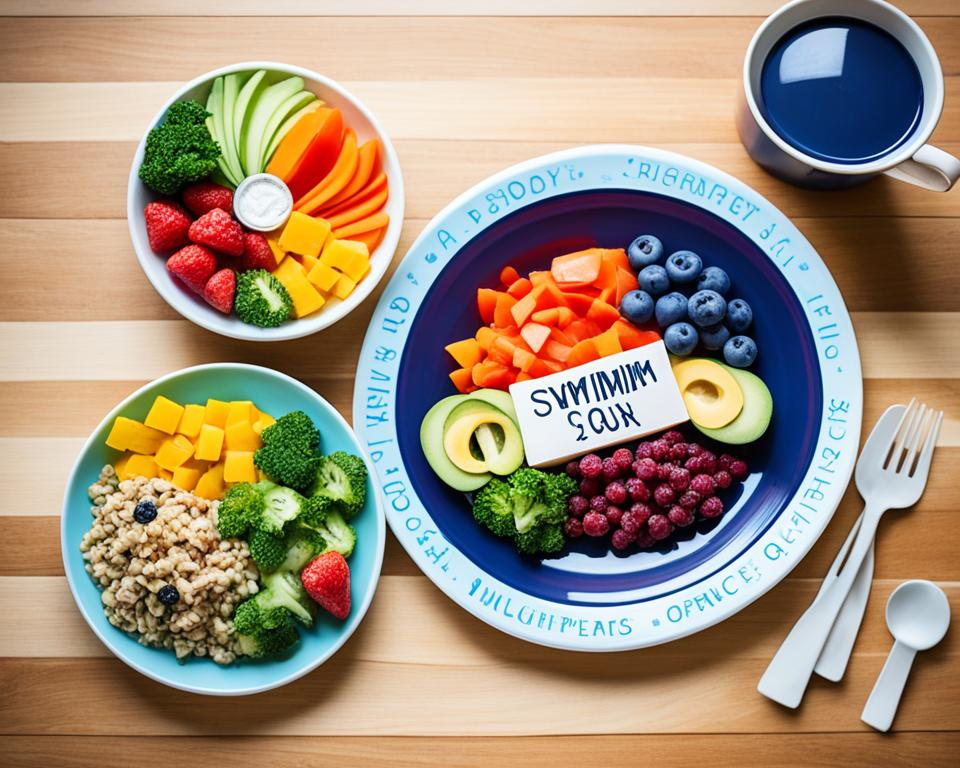
“Proper nutrition is the foundation of my training and racing. It’s not just about fueling my body, but nourishing it to reach new levels of performance.”
– Michael Phelps, 23-time Olympic gold medalist
The Future of Olympic Swimming
The world of olympic swimming is always changing. There is a lot of excitement about what’s to come. A new group of talented swimmers is entering the scene. They come from different places and bring fresh ideas. With new training methods and the best technological advancements, they’re ready to amaze us in the water.
In the sport, new gear is making a big difference. Swimsuits and monitoring systems are getting better. This helps top swimmers perform at their best. Expect to see old records broken as things improve. The future of olympic swimming means we will see amazing races and new records. This will keep inspiring both the ones racing and those cheering them on.
| Technological Advancements | Impact on Olympic Swimming |
|---|---|
| Smart Swimsuits | Improved hydrodynamics and reduced drag |
| Underwater Cameras | Enhanced analysis and feedback for swimmers |
| Performance Tracking Sensors | Real-time monitoring of stroke technique and efficiency |
The olympic swimming world keeps growing. We can look forward to more amazing things. Talented newcomers and new technologies are creating lots of potential. We might see records being shattered. Everyone, from the athletes to the fans, will be thrilled.
Controversies and Doping Issues in Swimming
Olympic swimming is known for its great feats and inspiring tales. Still, there have been bumps on the road. Some swimmers have tried to gain an edge using performance-enhancing substances or methods. The lure of success, fame, and money might push them to make these choices.
This behavior threatens the integrity of the sport. It also casts a shadow on the hard work of clean athletes. The sport’s top bodies, such as FINA and the World Anti-Doping Agency, work hard. They set rules and conduct tests to keep swimming competitions fair and meaningful.
Maintaining Integrity in the Sport
Keeping the sport’s highest moral standards is key. This way, the amazing feats of Olympic swimmers rightfully inspire others. The battle against doping continues. Ensuring fair play is not easy but very important.
“The integrity of the sport is paramount, and we must remain vigilant in our efforts to protect it.”
Rigorous tests, education, and teamwork help keep Olympic swimming honest. As the sport grows, so should our dedication to preserving its values. This ensures its true champions are honored and encourage future swimmers.
Conclusion
In the exciting world of Olympic swimming, everyone wants to be the best. Michael Phelps is a perfect example. He has set records and won many gold medals. His success shows what hard work and talent can achieve.
As swimming grows, new talents emerge. Technology is also helping swimmers perform better. The future of Olympic swimming looks bright. We can expect more records and unforgettable moments.
Swimmers like Michael Phelps have truly raised the standard. They have shown us what true sportsmanship is. Their achievements inspire not just in the pool but also outside. They truly are legends in the world of sports.
